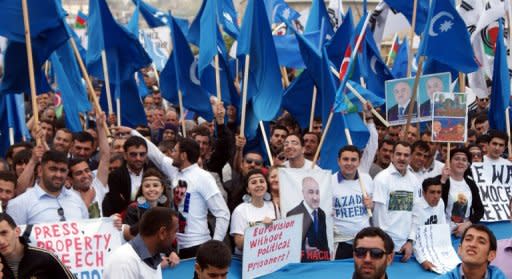Eurovision puts Azerbaijan in human rights spotlight
Standing on a peninsula that reaches out into Baku's Caspian Sea bay, the sparkling new Crystal Hall is a symbol of Azerbaijan's hopes and ambitions for next month's Eurovision song contest. As well as building the ultra-modern venue at breakneck speed, the ex-Soviet state has hung out Eurovision flags across the capital as public anticipation grows ahead of an event watched by an estimated 125 million viewers. "Naturally, a country which hosts this contest is given an opportunity to introduce itself to the whole world," said Tahir Mammadov, a member of the working group organising the event in Baku, promising a spectacular show spiced up with elements of traditional Azerbaijani folklore. But campaigners hope that it will also draw international attention to alleged human rights violations in Azerbaijan, an oil-rich, mainly Muslim but officially secular state led by strongman President Ilham Aliyev. "Human rights are being systematically violated in Azerbaijan," said Giorgi Gogia of Human Rights Watch, alleging that 70 people including seven journalists were currently in jail for political reasons. Rights groups say that freedom of expression is being suppressed and dissenting voices silenced as the authorities seek to enforce stability in a country that went through war and political turmoil after the Soviet collapse. Local activists have set up a campaign called Sing for Democracy in an attempt to ensure that politics joins pop at centre stage in media coverage of the contest. "Eurovision must be yet another tool to promote Azerbaijan's European integration, first of all through the improvement of the situation with human rights," said Rasul Jafarov of Sing for Democracy. The authorities have been infuriated by Western media reports which focus on democratic failings rather than economic successes in a country that has gained strategic importance by pumping oil to European markets and providing transit routes for the NATO-led campaign in Afghanistan. "Freedom of speech, democratic principles and human rights are fully respected in Azerbaijan," said Mubariz Gurbanly, a senior official from President Aliyev's governing New Azerbaijan party. Aliyev said earlier this month that a "dirty campaign" was being waged to discredit Azerbaijan through the media in what officials claim is a conspiracy masterminded by the country's Armenian enemies. Baku and Yerevan have been locked in conflict since Armenian forces seized the region of Nagorny Karabakh from Azerbaijan in a 1990s war that killed 30,000 -- an emotionally-charged issue that led Armenia to boycott this year's Eurovision. "Thanks to its financial resources, the Armenian lobby is securing the publication of negative materials about Azerbaijan," said Gurbanly. He added that "Islamophobes" were also responsible for some critical reports. "They simply do not like the fact that Eurovision is being held in a majority-Muslim country," he said. Azerbaijan's energy-fuelled economy has boomed since Aliyev came to power in 2003, succeeding his father Heydar, an ex-KGB officer and Communist-era boss. Aliyev was re-elected by a landslide in 2008, and a referendum victory the following year abolished a two-term presidential limit, offering him the possibility of ruling the country of 9.1 million people far into the future. Opposition protests, which were effectively banned for several years and broken up by riot police when they did take place, were recently permitted to resume on the outskirts of Baku but have failed to attract mass support. Azerbaijan is set to become a key link in the EU's Southern Gas Corridor pipeline project, and officials believe that Eurovision will also sprinkle some stardust on the country's image. "We are sure that when they (Eurovision fans) see Azerbaijan, they will love it," said organiser Mammadov.



